|
|
|
Sort Order |
|
|
|
Items / Page
|
|
|
|
|
|
|
| Srl | Item |
| 1 |
ID:
174839
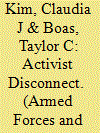

|
|
|
|
|
| Summary/Abstract |
Do activists seeking to challenge the U.S. military presence overseas succeed in persuading the local population? While the comparative literature on base contestation often makes implicit causal claims about public opinion and behavior, these claims have never been tested empirically using individual-level data. Based on an online survey, experiment with residents of communities hosting U.S. military bases in Korea and Japan, we demonstrate a disconnect between anti-base movements and local residents. Local public opinion is most responsive to pragmatic framing of opposition by social movements and tangible information about the consequences of base expansion. Other common activist tactics have little effect and may even backfire. Our findings fill an important gap in the growing literature on the politics of U.S. military bases abroad.
|
|
|
|
|
|
|
|
|
|
|
|
|
|
|
|
| 2 |
ID:
151371
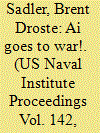

|
|
|
|
|
| Summary/Abstract |
Before an autonomous machine kills the first human on the battlefield, the U.S. military must have an ethical framework for employing such technology.
|
|
|
|
|
|
|
|
|
|
|
|
|
|
|
|
| 3 |
ID:
138622


|
|
|
|
|
| Summary/Abstract |
IF STRATEGY is the art of rethinking the possible, then the time for strategic innovation against what the U.S. military terms violent extremist organizations (VEOs) is now. The American-led air war in Iraq and Syria may have shown some progress against the Islamic State and other VEOs, but the VEOs and their sympathizers have hit back with attacks in France and brutal beheadings of journalists and aid workers. Frustration is growing in Congress as the traditional tools of American power fail to produce decisive results. But what can those on Capitol Hill do?
|
|
|
|
|
|
|
|
|
|
|
|
|
|
|
|
| 4 |
ID:
155262
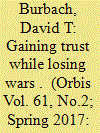

|
|
|
|
|
| Summary/Abstract |
During unpopular wars in Iraq and Afghanistan, the American public’s confidence in the U.S. military surprisingly rose to all-time highs. Confidence had been thought closely linked to battlefield success, so that increase was unexpected, and very unlike the crisis of confidence after Vietnam. Confidence can be better understood considering four dimensions: performance, professionalism, partisanship, and patriotism. The military has kept the public’s trust in part because, despite disappointing outcomes, it has not suffered organizational and professional breakdowns as happened after Vietnam. In addition, in the post-conscription era, expressing “confidence” is a low-cost way for disconnected citizens to express gratitude—even if they largely disagree with military preferences. Finally, a wide partisan confidence gap opened after 2003, suggesting that confidence increasingly reflects political identities rather than objective assessment of the state of the military.
|
|
|
|
|
|
|
|
|
|
|
|
|
|
|
|
| 5 |
ID:
091795
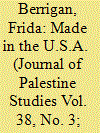

|
|
|
|
|
| Publication |
2009.
|
| Summary/Abstract |
Enforcement of U.S. law concerning weapons exports and the disbursement of military aid are subject to highly politicized interpretations of concepts like "legitimate self-defense" and "safeguarding internal security." As illustrated by Israel's July 2006 war in Lebanon and its 2008-2009 Operation Cast Lead in Gaza, Washington has essentially allowed Israel to define "self-defense" however it chooses. This overview of U.S. military aid to Israel, including weapons sales and related support of its domestic military industrial complex, examines in detail the mechanisms through which aid is funneled, the restrictions on aid that do exist, and the uses to which U.S. military aid has been put-particularly in terms of Israel's military operations and its exports abroad.
|
|
|
|
|
|
|
|
|
|
|
|
|
|
|
|
| 6 |
ID:
152909
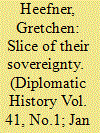

|
|
|
|
|
| Summary/Abstract |
Using the case study of Libya, this article examines how U.S. policymakers sought to rationalize their appropriation of sovereign territory for strategic needs in the 1940s. This article also demonstrates how scholars can use the often-overlooked infrastructure of the U.S. military to historicize the bottom-up construction of U.S. global power.
|
|
|
|
|
|
|
|
|
|
|
|
|
|
|
|
| 7 |
ID:
152316
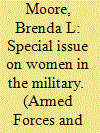

|
|
|
|
|
| Summary/Abstract |
This Armed Forces & Society issue is on women in the contemporary armed forces in the United States and other nations to include the South African National Defense Force and the Australian Defense Force. This issue contains a collection of nine papers, each reviewing a current aspect of women serving in the military since the post–Vietnam War Era. There are also two review essays of Megan Mackenzie’s book, Beyond the Band of Brothers: The US Military and the Myth That Women Can’t Fight. An overview of changing laws and the expanding role of women in the military is provided in this introduction, as well as summaries of the nine articles, and comments on the two book reviews mentioned above.
|
|
|
|
|
|
|
|
|
|
|
|
|
|
|
|
| 8 |
ID:
146440
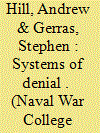

|
|
|
|
|
| Summary/Abstract |
Successful organizations can be extraordinarily persistent and creative in denying the obvious, ignoring signals that suggest a need to challenge key strategic assumptions. The U.S. military has been the world’s unrivaled force for twenty-five years, even lacking a peer competitor in some domains—naval operations, for example—since 1943. A danger of such sustained success is that the military might come to view these strategic assumptions not as ideas requiring continual reassessment but as enduring laws.
|
|
|
|
|
|
|
|
|
|
|
|
|
|
|
|
| 9 |
ID:
176318
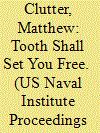

|
|
|
|
|
| Summary/Abstract |
At the beginning of 2005, the U.S. military was still trudging its way through an intensifying war in Iraq just 13 months after having pulled Saddam Hussein from a spider hole in Ad Dawr. U.S. support for the war had been waning since his capture in December 2003, as the post-9/11, pro-war glow had worn off, revealing instead its stark and bloody tragedies. This grim reality was punctuated with a deadly exclamation point on 26 January 2005, when 37 U.S. troops were killed, the deadliest day to date of the Iraq war. Among those killed were 31 who died in a helicopter crash. And among those 31 was Hospital Corpsman Third Class (HM3) John House.
|
|
|
|
|
|
|
|
|
|
|
|
|
|
|
|
| 10 |
ID:
176317
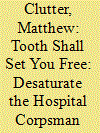

|
|
|
|
|
| Summary/Abstract |
At the beginning of 2005, the U.S. military was still trudging its way through an intensifying war in Iraq just 13 months after having pulled Saddam Hussein from a spider hole in Ad Dawr. U.S. support for the war had been waning since his capture in December 2003, as the post-9/11, pro-war glow had worn off, revealing instead its stark and bloody tragedies. This grim reality was punctuated with a deadly exclamation point on 26 January 2005, when 37 U.S. troops were killed, the deadliest day to date of the Iraq war. Among those killed were 31 who died in a helicopter crash. And among those 31 was Hospital Corpsman Third Class (HM3) John House.
|
|
|
|
|
|
|
|
|
|
|
|
|
|
|
|
| 11 |
ID:
186347
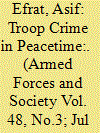

|
|
|
|
|
| Summary/Abstract |
U.S. forces abroad have often faced complaints about crimes committed by troops, yet we lack systematic quantitative information on such crimes. Based on newly discovered data compiled by the Army, this article presents a comprehensive and detailed picture of American troops’ criminal activity worldwide during the Cold War (1954–1970). The data show that troops engaged in significant criminality, with a particularly high rate of violent crime—homicide, rape, and robbery—and a relatively low rate of property crime. Host countries treated offending troops leniently: Prison sentences were rare, and they averaged less than 2 years in duration. The data presented here hold far-reaching implications for our understanding of the relations between U.S. forces and host countries and the legacy of U.S. military deployments.
|
|
|
|
|
|
|
|
|
|
|
|
|
|
|
|
| 12 |
ID:
186321


|
|
|
|
|
| Summary/Abstract |
Civilian control of the military is central to the making of security policy, ensuring that civilian officials and the elected leaders that appoint them oversee and decide military affairs. This paper exposes a challenge to civilian control in the United States that originates in the disparaging attitudes military personnel hold toward civilian society. We argue that when military personnel view military culture as superior, they are more likely to view civilian political leaders as illegitimate and in turn to favor actions that undermine civilian control. We develop a typology of civilian control in which military officers can constrain, contest and limit civilian authority. Our empirical analysis provides strong and consistent evidence of the corrosive effects of military superiority on civilian control across three surveys of U.S. military personnel: the 1998-99 TISS survey of 2901 military officers, a 2014 YouGov of 275 veterans, and an original 2020 survey of 770 West Point cadets.
|
|
|
|
|
|
|
|
|
|
|
|
|
|
|
|
| 13 |
ID:
089130
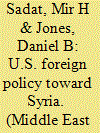

|
|
|
|
|
| Publication |
2009.
|
| Summary/Abstract |
To the Muslim world, we seek a new way forward, based on mutual interest and mutual respect. To those leaders around the globe who seek to sow conflict or blame their society's ills on the West, know that your people will judge you on what you can build, not what you destroy. To those who cling to power through corruption and deceit and the silencing of dissent, know that you are on the wrong side of history but that we will extend a hand if you are willing to unclench your fist.
|
|
|
|
|
|
|
|
|
|
|
|
|
|
|
|
| 14 |
ID:
137970
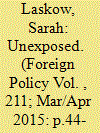

|
|
|
|
|
| Summary/Abstract |
At 6:45 a.m. on March 1, 1954, the earth rumbled beneath 10-year-old Jalel John’s feet as she stood on Ailuk Atoll in the Marshall Islands. Above her, half the sky turned strange colors. She remembers, in particular, the reds—the uncanny shades of red. Within six minutes, a mushroom cloud reached 130,000 feet overhead, pulling with it the pulverized coral of islands. Left behind was a crater that measured more than a mile wide and 250 feet deep, vast enough to be visible from space. Some 350 miles away from the blast, John experienced the largest thermonuclear explosion that the U.S. military would ever detonate, a test known as Castle Bravo. (It reached a yield of 15 megatons; in layman’s terms, that’s 1,000 times more powerful than the bomb dropped over Hiroshima.)
|
|
|
|
|
|
|
|
|
|
|
|
|
|
|
|
| 15 |
ID:
113903
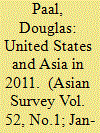

|
|
|
|
|
| Publication |
2012.
|
| Summary/Abstract |
The Obama administration moved to stabilize 2010's deteriorating relations with China and exploit the opportunity to deepen ties with China's nervous neighbors. Diplomatic, economic, and security initiatives were melded to "rebalance" American resources and attention to Asia in the 21st century. Early 2011 euphoria about China's rise and gloom about America's decline began to reverse themselves by end 2011. Obama made a key policy statement about the Asia-Pacific region in his address to Australia's Parliament.
|
|
|
|
|
|
|
|
|
|
|
|
|
|
|
|
|
|
|
|
|